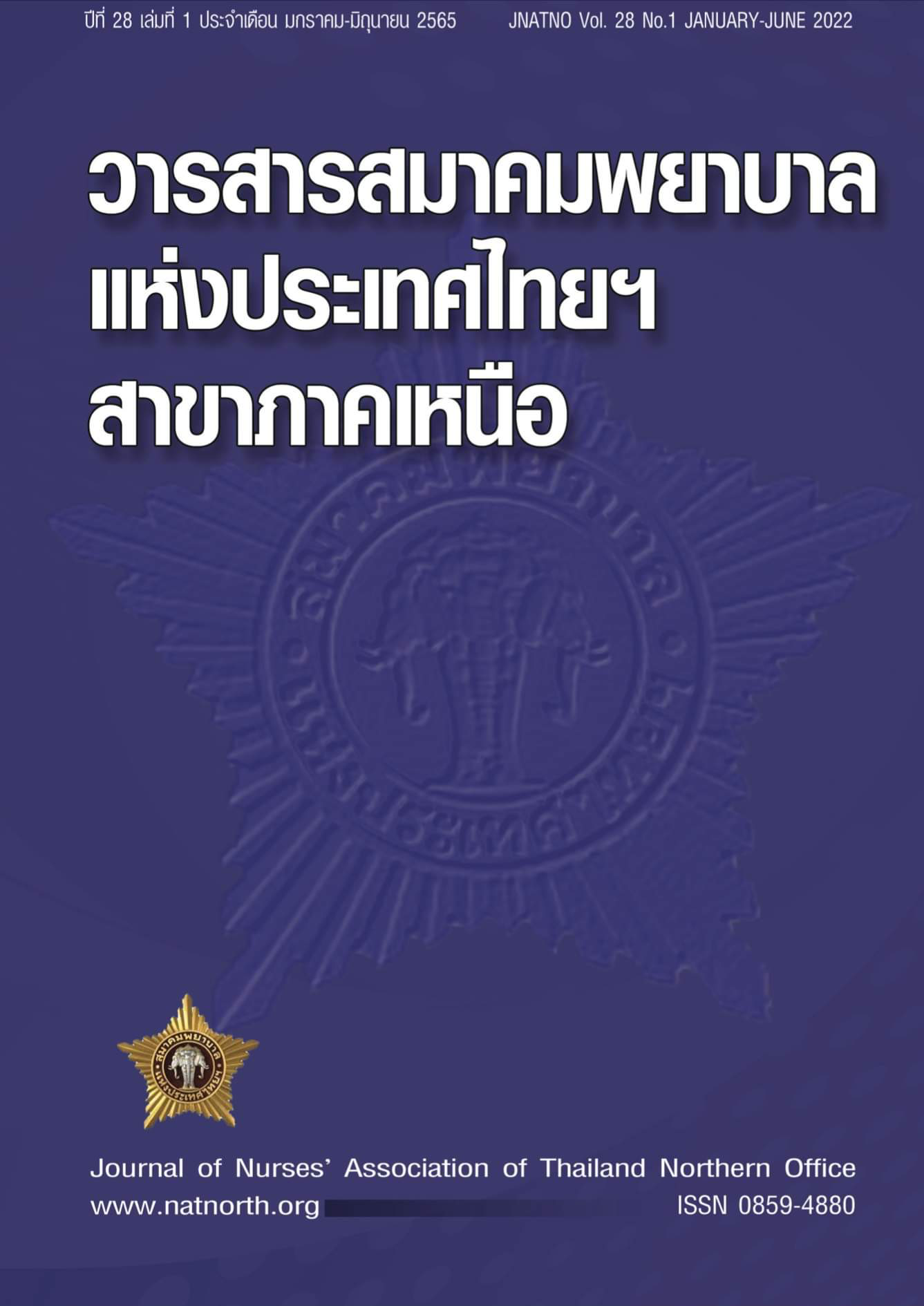การวิเคราะห์ผลกระทบของสถานการณ์ระบาดของโรคโควิด-19 ต่อระบบบริการสำหรับผู้ป่วยโรคเบาหวานในประเทศไทย
บทคัดย่อ
การวิจัยเชิงคุณภาพแบบพรรณนาครั้งนี้มีวัตถุประสงค์ เพื่อวิเคราะห์ผลกระทบสถานการณ์ระบาดของโรคโควิด-19 ต่อระบบบริการสำหรับผู้ป่วยโรคเบาหวานในประเทศไทย รวบรวมข้อมูลจากผู้ให้ข้อมูล จำนวน 34 คน โดยการเลือกแบบเจาะจงจากผู้บริหารและพยาบาลวิชาชีพของโรงพยาบาลระดับตติยภูมิจากแต่ละภูมิภาคที่มีอุบัติการณ์ของโรคโควิค-19 สูง จำนวน 5 แห่ง เครื่องมือที่ใช้ในการเก็บข้อมูล คือ แบบสัมภาษณ์แบบมีโครงสร้าง ทำการรวบรวมข้อมูลโดยการสัมภาษณ์เชิงลึก วิเคราะห์ข้อมูลโดยการวิเคราะห์เนื้อหาเชิงคุณภาพโดยพรรณนาความ
ผลการวิจัย พบว่า สถานการณ์ระบาดของโรคโควิค-19 ส่งผลให้ผู้ป่วยเบาหวานมีข้อจำกัดการเข้าถึงบริการในโรงพยาบาล การบริการตรวจเลือด การรับยา โดยเฉพาะยาอินซูลิน เมื่อพิจารณาการจัดระบบบริการสำหรับผู้ป่วยเบาหวานตามกรอบของต้นแบบการดูแลโรคเรื้อรังแบบขยาย พบว่า ชุมชนและระบบบริการสุขภาพร่วมมือกันในการจัดรูปแบบบริการวิถีใหม่ ดังนี้ 1) สร้างนโยบายสาธารณสุขสุขภาพดี คือ ลดความแออัดและเว้นระยะห่างทางสังคม 2) สร้างสิ่งแวดล้อมที่เอื้อต่อการดูแลสุขภาพและป้องกันการติดเชื้อในโรงพยาบาล และ 3) สร้างเข้มแข็ง โดยการขอความร่วมมือและการสร้างเครือข่าย สำหรับระบบสุขภาพมีการจัดบริการตาม 6 องค์ประกอบหลัก ดังนี้ 1) การสนับสนุนการจัดการตนเอง สนับสนุนให้ดูแลตนเองที่บ้าน แต่เกิดข้อจำกัดในการสื่อสารกับบุคลากรทางสุขภาพ 2) การพัฒนาทักษะส่วนบุคคล มีการพัฒนาทักษะการใช้สื่อออนไลน์ 3) การออกแบบระบบบริการ มีการบริการวิถีใหม่ 4) การจัดรูปแบบบริการใหม่ มีการแบ่งประเภทผู้ป่วย 5) การสนับสนุนการตัดสินใจ มีภาวะผู้นำในการตัดสินใจในภาวะวิกฤติ และ 6) ระบบข้อมูลข่าวสารและสารสนเทศ มีการใช้ข้อมูลข่าวสารและเทคโนโลยีเพื่อการบริหารงาน
สรุป ผู้ป่วยเบาหวานได้รับผลกระทบต่อการเข้าถึงระบบบริการของโรงพยาบาลในสถานการณ์ระบาดของโรคโควิค-19 แต่ชุมชนและระบบสุขภาพมีการปรับระบบบริการ เพื่อดูแลผู้ป่วยเบาหวานได้อย่างต่อเนื่อง
เอกสารอ้างอิง
The Johns Hopkins Department of Civil and Systems Engineering. COVID-19 Dashboard by the Center for Systems Science and Engineering (CSSE) [Internet]: Johns Hopkins University (JHU); 2020 [updated April 15, 2020; cited 2020 April 15]. Available from: https://gisanddata.maps.arcgis.com/apps/opsdashboard/index.html#/bda7594740fd40299423467b48e9ecf6.
Fisher, D. & Heymann, D. Q&A: The novel coronavirus outbreak causing COVID-19. BMC Med. 2020;18(1):1-3. doi: https://doi.org/10.1186/s12916-020-01533-w.
Shang, L., Shao, M., Guo, Q., Shi, J., Zhao, Y., Xiaokereti, J., et al. Diabetes mellitus is associated with severe infection and mortality in patients with COVID-19: A systematic review and meta-analysis. Arch Med Res. 2020;51(7):700-9. doi: 10.1016/j.arcmed.2020.07.005.
Kaufman, N.D., Chasombat, S., Tanomsingh, S., Rajataramya, B. & Potempa, K. Public health in Thailand: Emerging focus on non‐communicable diseases. Int J Health Plan Manag 2011;26(3):e197-e212. doi: https://doi.org/10.1002/hpm.1078.
Morens, D.M., Folkers, G.K & Fauci, A.S. The challenge of emerging and re-emerging infectious diseases. Nature. 2004;430(6996):242-9. doi: https://doi.org/10.1038/nature02759.
Barrett, R., Kuzawa, C.W., McDade, T. & Armelagos, G.J. Emerging and re-emerging infectious diseases: the third epidemiologic transition. Annu Rev Anthropol 1998;27(1):247-71. doi: https://doi.org/10.1146/annurev.anthro.27.1.247.
Boutayeb, A. The double burden of communicable and non-communicable diseases in developing countries. Trans R Soc Trop Med Hyg. 2006;100(3):191-9. doi: https://doi.org/10.1016/j.trstmh.2005.07.021.
Barr, V., Robinson, S., Marin-Link, B., Underhill, L., Dotts, A., Ravensdale, D., et al. The expanded chronic care model. 2003. doi: https://www.area-c54.it/public/the%20expanded%20chronic%20care%20model.pdf.
Lincoln YS, Guba EG. Naturalistic inquiry: sage;1985.
Cope, D.G. Methods and Meanings: Credibility and Trustworthiness of Qualitative Research. Oncol Nurs Forum 2014;41(1):89-91. doi: 10.1188/14.ONF.89-91.
Connelly, L.M. Trustworthiness in qualitative research. Medsurg Nurs 2016;25(6):435.
United Nations Thailand. Social Impact Assessment of COVID-19 in Thailand. United Kingdom: Oxford Policy Management;2020.
สมาคมโรคเบาหวานแห่งประเทศไทย. แนวทางเวชปฏิบัติสําาหรับโรคเบาหวาน 2560 Clinical Practice Guideline for Diabetes 2017. ปทุมธานี: บริษัท ร่มเย็น มีเดีย จำกัด;2560.
Nouhjah, S.& Jahanfar, S. Challenges of Diabetes Care Management in Developing Countries with a High Incidence of COVID-19: A brief report. Diabetes & Metabolic Syndrome. JCRR 2020;14:731-2. doi: https://doi.org/10.1016/j.dsx.2020.05.012.
Bornstein, R.S., Rubino, F., Khunti, K., Mingrone, G., Hopkins, D., Birkenfeld, L.A, et al. Practical recommendations for the management of diabetes in patients with COVID-19. Lancet Diabetes Endocrinol 2020;8:546-50. doi: https://doi.org/10.1016/S2213-8587(20)30152-2.
Koliaki, C., Tentolouris, A., Eleftheriadou, I., Melidonis, A., Dimitriadis, G. & Tentolouris, N. Clinical management of diabetes mellitus in the era of COVID-19: practical issues, peculiarities and concerns. J Clin Med 2020;9(7):2288. doi: https://doi.org/10.3390/jcm9072288.
Standiford, T.C, Davuluri. K., Trupiano, N., Portney, D., Gruppen, L. & Vinson, A.H. Physician leadership during the COVID-19 pandemic: an emphasis on the team, well-being and leadership reasoning. BMJ Lead 2021;5:20-5. doi: doi:10.1136/leader-2020-000344.
ดาวน์โหลด
เผยแพร่แล้ว
รูปแบบการอ้างอิง
ฉบับ
ประเภทบทความ
สัญญาอนุญาต
ลิขสิทธิ์ (c) 2022 สมาคมพยาบาลแห่งประเทศไทยฯ สาขาภาคเหนือ

อนุญาตภายใต้เงื่อนไข Creative Commons Attribution-NonCommercial-NoDerivatives 4.0 International License.
บทความที่ได้รับการตีพิมพ์เป็นลิขสิทธิ์ของสมาคมพยาบาลแห่งประเทศไทยฯ สาขาภาคเหนือ
เนื้อหาและข้อคิดเห็นใดๆ ที่ตีพิมพ์ในวารสารสมาคมพยาบาลฯ ถือเป็นความรับผิดชอบของผู้เขียนเท่านั้น ผู้เขียนบทความต้องศึกษารายละเอียดหลักเกณฑ์การจัดทำต้นฉบับตามที่วารสารกำหนด และเนื้อหาส่วนภาษาอังกฤษต้องได้รับการตรวจสอบจากเจ้าของภาษามาแล้ว


